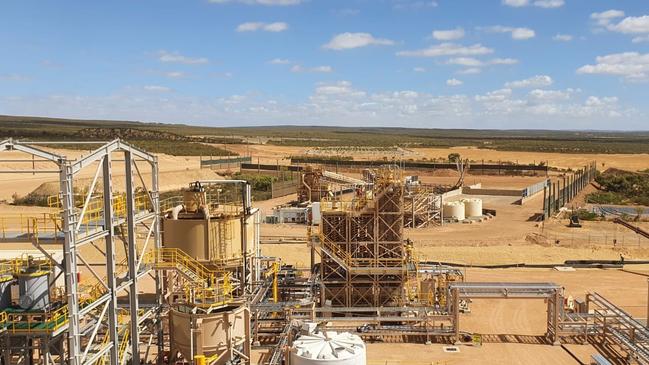Chris Ellison says federal budget tells critical minerals sector to ‘go it alone’
Chris Ellison has lashed Jim Chalmers’ budget for failing to back the country’s emerging critical minerals sector.

Mineral Resources boss Chris Ellison has lashed Treasurer Jim Chalmers’ second federal budget for failing to back the country’s emerging critical minerals sector, saying it effectively told Australia’s miners to “go it alone”.
Mr Ellison joined Iluka boss Tom O’Leary in warning that Australia risks missing out on a chance to build its manufacturing industry due to a lack of significant support for downstream minerals processing and the development of a major new chemicals industry.
Speaking to shareholders at Iluka’s annual meeting on Wednesday, Mr O’Leary did not specifically reference Tuesday’s federal budget but said Australia risked missing out on a generational opportunity in manufacturing without support for downstream processing.
In a pre-budget paper circulated to MPs and ministers, MinRes had called for the establishment of a direct grant program for processing initiatives in the battery mineral supply chain, offering 20 to 50 per cent of project capital costs.
The mining and services major also called for an accelerated tax write-off program for battery chemical projects, along with other tax breaks and direct government investment in infrastructure and approvals streamlining.
But Mr Chalmers budget contained only limited new measures to assist the critical minerals sector, outside of a $57.1m funding over four years for “international engagement” to promote the sector and $23.4m policy development and project facilitation.
The budget had ongoing support for the $2bn Morrison-era Critical Minerals facility – the bulk of which is already committed, partly to Iluka’s WA rare earth refinery – and another $1bn from the National Reconstruction Fund for value-adding minerals projects, previously announced by the federal government.
The budget included a $2bn funding package for the development of green hydrogen projects, but little additional help for Australia’s mining and processing sector.
Mr Ellison said that was not enough to keep Australia competitive as other countries pump billions of dollars into the downstream manufacturing of chemicals and batteries needed for global decarbonisation efforts.
“While governments around the world are racing to grow the battery supply chain, the Australian government is telling industry to go it alone,” he said.
“Australia now has a significant handicap, the only result of which will be more investment overseas, and the opportunity for thousands of jobs and billions in value from our resources being lost offshore.”
Mr O’Leary told Iluka shareholders on Wednesday Australia risked missing its opportunity to become a manufacturing nation if miners were allowed to export rare earth raw materials rather than commit to downstream processing.
Speaking at the mineral sands major’s annual shareholder meeting, Mr O’Leary said the critical minerals boom gave Australia a once in a generation opportunity to discard its reputation as a nation that only exported raw materials. This would be missed if governments and resource companies did not take a more ambitious approach to processing rare earths and other critical minerals.
“We’ve always been a trading nation; and bulk agricultural and then commodity exports have enriched Australia for decades. But I think many would agree that, as we reflect back, perhaps an opportunity was missed in the 1960s and 1970s to establish lasting value addition in the Australian economy alongside the birth of the iron ore industry,” he said.
“Instead, for a range of reasons that opportunity was won by other nations with greater ambition and commitment.
“We have now arrived at a similar historic moment for critical minerals, with the prospect of seeding the advanced manufacturing industries that will have increased longevity and strategic importance; and which could help underpin Australia’s security and prosperity in the century ahead.”
Iluka is building a rare earth refinery near Geraldton in WA, backed by $1.2bn in cheap loans from the federal government’s $2bn Critical Minerals Facility, and Mr O’Leary said the rest of Australia’s minerals sector should demonstrate the same ambition.
“Insofar as rare earths are concerned, our ambition should not be limited to being the quarry of others; refining, metallising and eventually magnetising these key products for ourselves and our international partners that need them is a rational and, with appropriate policy settings and commitment, an achievable ambition,” he said.
The government has offered funding to some rare earth and lithium companies through its Northern Australia Infrastructure Facility, including ASX-listed Hastings Technology Metals, which is backed by Andrew Forrest’s Wyloo Metals and has received $300m in commitments from NAIF and Export Finance Australia for the development of its $650m Yangibana rare earth project in WA.
Hastings chief executive Alwyn Vorster said the federal government commitments to the company’s project were very welcome, but said broader support for the industry was also needed to ensure Australia captured the full value of its mineral wealth.
“If Australia is serious about taking a much larger market share of the growing demand for rare earths and downstream permanent magnet opportunities, then this industry will need additional incentives to establish itself; this is even more acute for emerging producers with significant capital requirements,” he said.
“I would encourage the government to consider how policies like the IRA in the USA could lead to increased investment and development of rare earth and magnet projects, to ensure Australia leads the way.”
A spokesman for federal Resources Minister Madeleine King said the government would release its critical minerals strategy “shortly”.
“The strategy will outline the government’s priorities for the development of the critical minerals sector, including how Australia can create economic opportunities across the nation, seize the opportunities of the net zero transformation and establish robust, sustainable and diverse supply chains,” the spokesman said.


To join the conversation, please log in. Don't have an account? Register
Join the conversation, you are commenting as Logout